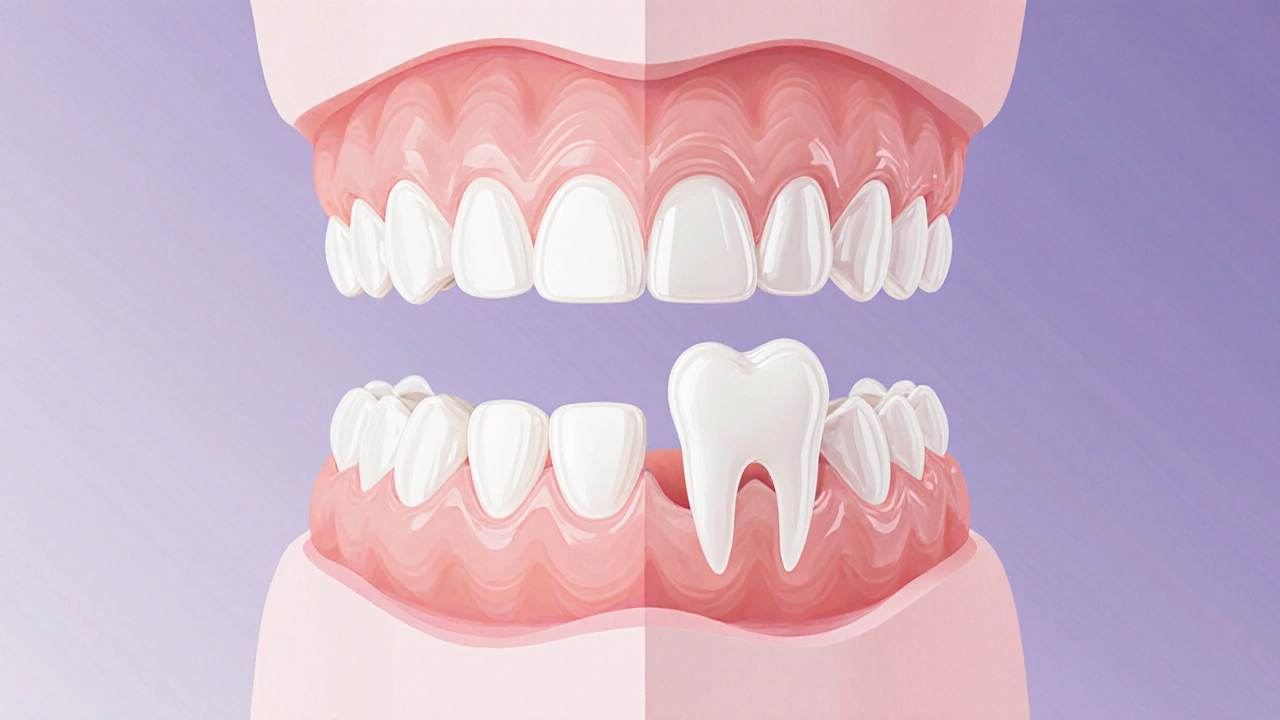 Nov, 1 2025
Nov, 1 2025
Dental Treatment Cost Calculator
Compare Your Options
See estimated costs for alternatives to dental implants based on your situation
Let’s be honest - dental implants in the UK can cost anywhere from £2,000 to £3,500 per tooth. That’s not just expensive. For many, it’s out of reach. If you’re staring at a quote and wondering if there’s something that actually works without draining your savings, you’re not alone. The good news? There are several proven, affordable alternatives to dental implants that deliver function, comfort, and confidence - without the six-figure price tag.
What Makes Dental Implants So Expensive?
Dental implants aren’t just a tooth replacement. They’re a full surgical procedure. The cost includes the titanium post drilled into your jawbone, the abutment that connects it, and the custom crown on top. Add in specialist dentist fees, X-rays, CT scans, and healing time, and it adds up fast. Many clinics bundle everything into one high price because they’re selling a permanent solution. But permanence doesn’t always mean necessity.
For people who don’t need a lifelong fix - or who can’t afford one - the real question isn’t whether implants are better. It’s whether you actually need them.
Dental Bridges: The Middle Ground
A dental bridge is the most common alternative. It replaces one or more missing teeth by anchoring artificial teeth to the natural ones on either side. Think of it like a bridge spanning a gap, supported by the teeth next to it.
Traditional bridges cost between £500 and £1,200 per tooth in the UK. That’s roughly half the price of an implant - and often less if you’re replacing multiple teeth in a row. The procedure takes just two visits. No surgery. No months of healing. No risk of implant failure.
Here’s the catch: the supporting teeth need to be healthy. Your dentist will need to shave them down slightly to fit crowns that hold the bridge. If those teeth are already filled or weakened, a bridge might not be the best fit. But if your adjacent teeth are strong, a bridge gives you a natural-looking, stable result that lasts 10-15 years with good care.
Dentures: Affordable and Effective
If you’re missing several teeth - or an entire arch - dentures are still the most cost-effective option. Full or partial acrylic dentures start at £300-£800 in the UK. Even premium flexible dentures (made from soft, gum-coloured material) rarely top £1,500.
Modern dentures are nothing like the old, wobbly ones you might remember. Today’s versions use high-quality acrylics, precision fittings, and digital scanning to sit comfortably. Many people forget they’re wearing them. They eat, speak, and smile naturally.
Some clinics offer implant-retained dentures - where just two or four implants hold a full denture in place. This hybrid solution costs £3,000-£6,000 for a full arch, which is still cheaper than individual implants for every missing tooth. It’s a smart middle ground: stability without the full implant price.
Adhesive Dentures and Partial Dentures
For people on tight budgets, adhesive dentures (also called snap-on dentures) are a quiet hero. These are removable partial or full dentures that stick to your gums with a medical-grade adhesive. No metal clasps. No surgery. No drilling. Just pop them in and out.
They’re ideal for older adults who don’t want invasive procedures or those with medical conditions that make surgery risky. They’re also perfect if you’re waiting to save up for implants later. You get immediate function and appearance, with zero downtime.
They’re not as stable as implants or bridges, but for many, that’s a fair trade-off. A £400 adhesive denture that lets you eat an apple again? That’s a win.

When Should You Avoid Alternatives?
Not every alternative works for everyone. If you’re missing a single front tooth and you’re under 40, a bridge or denture might feel temporary - and you might regret not going for an implant down the line. Bone loss can start within months after losing a tooth. Implants prevent that.
Also, if you grind your teeth, have gum disease, or smoke, implants have a higher failure rate. But so do bridges - because gum disease attacks the supporting teeth too. In these cases, dentures are often the safer, more predictable option.
Bottom line: alternatives aren’t second-best. They’re smart choices for the right situation.
Cost Comparison: Implants vs Alternatives
| Option | Cost per Tooth/Arch | Procedure Time | Longevity | Requires Surgery? |
|---|---|---|---|---|
| Dental Implant | £2,000-£3,500 | 3-6 months | 20+ years | Yes |
| Dental Bridge | £500-£1,200 | 2-3 weeks | 10-15 years | No |
| Full Acrylic Dentures | £300-£800 | 2-4 weeks | 5-10 years | No |
| Adhesive Dentures | £250-£600 | 1-2 weeks | 3-7 years | No |
| Implant-Retained Dentures | £3,000-£6,000 (for full arch) | 4-8 months | 15+ years | Yes (2-4 implants) |
What About NHS Options?
If you’re eligible for NHS dental care, you might get a denture or bridge for a Band 3 fee of £319.80 (as of 2025). That’s a massive saving. But NHS availability is limited. Waiting times can stretch to months. And you won’t get premium materials - metal clasps, basic acrylics, fewer colour options.
Still, for someone on a tight income, an NHS denture is better than nothing. Many people use it as a temporary fix while saving for something better. Others keep it for years with no issues.

How to Decide What’s Right for You
Ask yourself these three questions:
- How many teeth are missing? One? A bridge might work. Several? Dentures or implant-retained dentures make more sense.
- How long do you plan to keep this solution? If you’re 75 and don’t expect to live another 20 years, a £400 denture is practical. If you’re 35 and want something that lasts decades, implants or implant-retained dentures are worth the investment.
- What’s your oral health like? If your gums are healthy and your jawbone is strong, you have options. If you have bone loss or gum disease, implants may fail - and bridges can damage healthy teeth. Dentures become the safest bet.
Don’t rush. Get a second opinion. Many private clinics offer free consultations. Bring your X-rays. Ask about payment plans. Some clinics let you pay for dentures in monthly instalments - no credit check.
Real Stories, Real Savings
Sarah, 68, lost three front teeth after an accident. Her dentist quoted £9,000 for three implants. She opted for a partial acrylic denture for £550. She wears it only when going out. At home, she leaves it out. She says: "I didn’t need perfection. I needed to smile without hiding. This did that."
Mark, 52, had a molar pulled and was told he needed an implant. He got a bridge instead - £850. His two supporting teeth were healthy. Five years later, it’s still solid. "I saved £2,500 and didn’t have to go under the knife. No regrets."
Final Thought: It’s Not About Cheapest - It’s About Right
Dental implants are amazing. But they’re not the only way to restore your smile. For thousands in the UK, bridges, dentures, and adhesive options are the smart, realistic, and affordable choice. They’re not failures. They’re solutions.
Don’t let a high price tag make you feel like you’ve lost your options. You haven’t. You just need to pick the one that fits your life - not someone else’s dream.
Are cheaper alternatives as good as dental implants?
They’re not the same - but they can be just as effective for your needs. Implants are the most durable and prevent bone loss, but bridges and dentures restore chewing, speaking, and appearance at a fraction of the cost. Many people live happily for years with alternatives - especially if they’re not missing every tooth or don’t need maximum stability.
Can I get dental implants later if I start with dentures?
Yes - but with conditions. If you’ve been missing teeth for years, your jawbone may have shrunk. That makes implants harder and more expensive, because you’ll need a bone graft first. Starting with dentures doesn’t ruin your chances - but the longer you wait, the more complex (and costly) future implants become.
Do dental bridges damage healthy teeth?
They require the adjacent teeth to be filed down to support the bridge. That’s irreversible. If those teeth are already strong and healthy, the trade-off is often worth it. But if they’re healthy and you’re young, some dentists recommend waiting - especially if you can afford to save for implants later.
Are flexible dentures better than acrylic ones?
Flexible dentures (made from nylon-based materials) are more comfortable and don’t use metal clasps, so they’re less visible. They’re also gentler on gums. But they’re more expensive (£800-£1,500) and harder to repair. Acrylic dentures are cheaper, easier to fix, and still work well for most people.
Is there a way to pay for alternatives in instalments?
Yes. Many private dental clinics in the UK offer interest-free payment plans for dentures, bridges, and even implant-retained options. You can often spread payments over 6 to 24 months. Ask for a treatment plan with financing options - you don’t need perfect credit to qualify.
